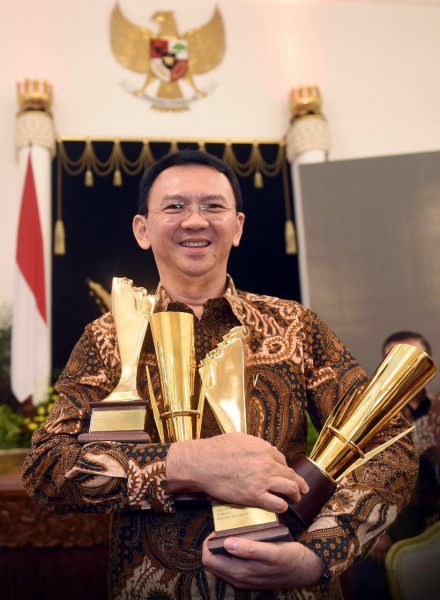President Joko ‘Jokowi’ Widodo’s plan to lure international investors to Indonesia’s vital infrastructure, maritime and tourism sectors may have hit a snag after the election loss and imprisonment of Jakarta Governor Basuki ‘Ahok’ Tjahaja Purnama, analysts say.
Ahead of the election — which saw voters return to the polls for a run-off vote between the incumbent Ahok and Vice Governor Djarot Saiful Hidayat face off against former Jokowi minister Anies Baswedan and businessman Sandiaga Uno on April 19 — analysts and officials predicted an Ahok loss could spell the end for many of the city’s most promising infrastructure projects.
A recent Asian Development Bank report warned the country must invest a minimum US$1.2 trillion in infrastructure by 2030 to maintain growth and end poverty. Government data shows only 40 percent of the nearly US$400 billion needed to construct energy, transport and clean water infrastructure projects by 2019 can be funded by the state budget, demonstrating the urgency of bringing in more foreign investment.
Edward Gustley, co-founder of Penida Capital Advisors and long-time consultant for the Finance Ministry, praised Ahok and predecessor Jokowi for moving along projects which had been virtually abandoned under previous administrators.
In an interview with Bloomberg, Gustley pointed to the long-running Mass Rapid Transport subway project, on which he consulted in 1995 only to see successive governments bury it, as an example of the strengths of the Ahok government.
“Ahok is a doer, he’s delivered — he’s made things happen that over the last 20 years have not happened,” he said.
Since becoming governor in 2014, Ahok has been studiously at work experimenting with innovative and overdue policy changes in an effort to solve the sprawling city’s most pressing issues, particularly in clearing traffic and addressing flooding.
Ironically, some of these successful reforms have been blamed for his loss. The forced evictions of residents living alongside congested waterways which frequently flood was deeply unpopular among parts of the electorate and easily exploited by Ahok’s political opponents.
For Gustley, this is a moment in which leadership must choose a future for the city — long-term investors are looking for great opportunity, but certainty too.
“We’re in that transition phase of going to try and rework regulations that would allow for that kind of capital to be deployed over long periods of time. That’s the nexus, right now.”
Confidence in the Ahok government agenda is common across the regional business community and is reflected in Jakarta ranking among the best performing Asian markets last year.
This confidence is already beginning to diminish, with troubling results posted in the first half of this year. Jokowi has touted a 7 percent gross domestic product (GDP) growth target since his 2014 inauguration and often refers to an ever-strengthening infrastructure policy plan as the means through which to achieve this.
Faith in this figure is shaky. Ahead of the vote, Kartika Wirjoatmodjo, Chief of Executive of Bank Mandiri, told Reuters “we (should) make sure it doesn’t affect any of the long-term policies, especially on the openness and […] ease of doing business and attracting investment.”
A push for public private partnerships on major projects both in the capital and elsewhere around the country has proven successful, but not yet the new norm.
“If Indonesia is to grow faster than 5 percent GDP per annum, the stranglehold of the government corporations on infrastructure projects must be broken,” James Castle, financial analyst and CastleAsia founder, told Bloomberg.
Still, some investors remain upbeat. A report from Indonesia Investment released shortly after the results were known waved away fears, saying in the immediate future the results will have little impact on doing business in Jakarta.
“We’re not expecting the election to have a major impact on the economy, regardless of who wins,” Dian Ayu Yustina, economist at PT Bank Danamon Indonesia in Jakarta, told Bloomberg. “What I’m closely watching now is more on the domestic demand side.”
Meanwhile, concerns over the political and social unrest which came to a head during the campaign are unlikely to be solved quickly or quietly.
The campaign to oust Ahok and have him jailed on blasphemy charges has sparked a debate over pluralism and the growing influence of hardline Islamic forces, undermining the country’s stability and attractiveness as an investment destination.
“The political challenge from right-wing religious groups seems to be making the president much more hesitant to challenge the rent-seeking behaviour of some of his strongest political backers,” James Castle said during the Bloomberg interview.
Widespread international coverage of the thousands-strong anti-Ahok protests last year damaged Indonesia’s reputation as a moderate Muslim-majority country, forcing Jokowi and Islamic leaders on the defensive amid security concerns such as the destructive December 2 rally.
In it’s post election autopsy, Indonesia Investment was balanced in predicting what the result would mean in the lead-up to the 2019 election.
“Few are also concerned about the 2019 presidential election. Indeed, the Baswedan victory in Jakarta means defeated presidential candidate Prabowo Subianto (who backed Baswedan in the Jakarta election) got a moral boost that may convince him to run again in the 2019 presidential election.
“However, the position of President Joko Widodo should be strong enough to deal with the challenge. Widodo enjoys popularity across the country and is building up a good track record. Considering economic growth is accelerating, it should make matters only easier for him in the remaining two years of his first term.
“We also do not think radical Islamic voices are strong enough to do the same damage to Widodo that they had done to Ahok in the Jakarta election, simply because Widodo is a (Javanese) Muslim.”
With the appeals process still to play out in Ahok’s blasphemy case and Anies’ gubernatorial term not to begin until October, how this volatile dynamic plays out is near impossible to predict. But, with Jokowi continuing to champion both Indonesia’s pride in pluralism and as a hub for investment, foreign investors may be right in remaining optimistic.




